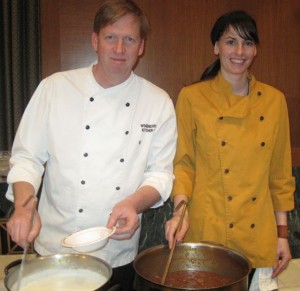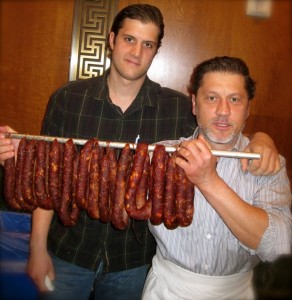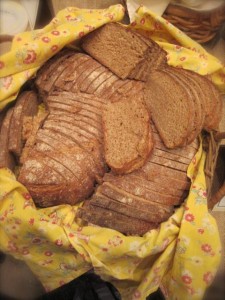Jordan Wright
March 2010

Local advocate and Weston A. Price Foundation publicist Kimberly Hartke of hartkeisonline.com - photo by Jordan Wright
Hartkeisonline published my story on the NICFA small farm lobby day on Capitol Hill.
Take a host of committed small farm advocates and add one part farmer to one part grower. Recruit a panoply of top chefs from Washington, Virginia and Baltimore, who graciously volunteered their time. Using all-natural ingredients donated by the participating local farms, passionately blend to create a delicious dish. The result: An inspiring and delightful event.
We begin with the language of organic, GMO and sustainable farming and the laws, like the very unsexy-sounding “S-510”, that govern food products and the farms they’re grown on. It’s enough to leave a layperson scratching their head and it’s easy to feel out of the lettered loop. There’s NICFA (National Independent Consumers and Farmers Association), HAACP (Hazard Analysis & Critical Control Points), LGMA (Leafy Greens Marketing Agreement), and UNCED (United Nations Conference on Environment and Development)…a puzzling jumble of acronyms to sort out…but this is a story of ourselves, the consumers, our farmer friends, and the restaurants that use the food they grow.
Last week farmers and believers organized by NICFA headed up to Capitol Hill to do some lobbying against a proposed bill entitled “S-510” that would impose draconian measures on the small farms that we, as consumers, overwhelmingly support. The bill, known innocuously as the “Food Safety Modernization Act”, favors large industrial farms and threatens the ability of the small farmer to do business. In its broad scope it would afford the FDA and USDA ever greater powers, needing only “reason to believe”, in order to quarantine or shut down a farm, and fine or imprison the farmer.
Don’t we all want our food to be safe? Well, of course we do…though the proof is in the pudding that less than one half of one percent of all foodborne illnesses originates on small farms.

Spike Gjerde (L) with sous chef of Woodbury Kitchens Restaurant at the NIFCA reception - photo by Jordan Wright
Frequent news reports reveal that it is the operations of large industrial farms that cause most food safety issues. Note: In the month of March alone dozens of food recalls were issued as a result of salmonella in hydrolyzed vegetable protein used pervasively in a multitude of food products such as pretzels and chips (several varieties of Pringles and Herr’s were on the list); seasoning mixes and dips (some from the ubiquitous T. Marzetti); and boullion cubes from grandma’s old stand-by Herb-Ox.
In addition thousands of pounds of such disparate products as pecans, pet foods, black pepper, and over 95,000 pounds of beef from North Carolina’s, Randall Packing, contaminated with E. coli, were recalled or voluntarily removed from grocery shelves. Just last month over 5 million pounds of veal and beef were recalled from one California meat packer. The list seems endless, the challenges insurmountable. I wonder if restaurants using these products will either care enough or be aware enough to remove them from their pantries.
A recently introduced new standard known as LGMA, Leafy Green Marketing Order, and written by industrial distributors, sounds docile and concerned about the safety of our veggies. Yet it is another burden on our small farms that has resulted in zero increase in food safety and has doubled costs to farmers within one year’s time. Its implementation has caused the closure of small slaughterhouses, causing farmers to ship their meat hundreds of miles back and forth to distant abatoirs for processing. As demand grows from consumers concerned about humane slaughter, we hope to see an increase in processing plants.

Beef Roasts from JuJo Acres farm prepared by Restaurant Nora's - photo by Jordan Wright
Translation to consumers like you and I: Higher costs for food produced by farmers, driving some out of business and limiting our options to purchase local foods at our farmers markets. This encourages “factory food” from farms run by huge agri-business conglomerates featuring genetically-modified and trademarked grain and industrially-raised and slaughtered cows, pigs and chicken.
On to HAACP, Hazard Analysis and Critical Control Points. It sounds as creepy as it is. As Joan Veon suggests, “This legislation will stymie small farms. It is a huge onus.”
If passed, HACCP would demand that all food producers, to include small jam and jelly preservers, picklers, local bread bakers and artisanal cheese makers, put together highly detailed production plans. These plans are often prohibitively expensive to a small independent farmer.
After a day of heavy lobbying on the Hill, guests, including Senator Mark Warner of Virginia and Senator Testor of Montana, were treated to a host of impassioned speakers. Iconic Virginia farmer, author and rock star of the sustainable food movement, Joel Salatin; David E. Gumpert, author of “The Raw Milk Revolution”; Chef Spike Gjerde of Baltimore’s highly rated Woodberry Kitchen Restaurant; and Joan Veon, Executive Director of The Women’s International Media Group, spoke about the impact of the restrictive S-510 on small farms.
From Gumpert, who also writes for Business Week Magazine, we heard about the economic impact S-510 could bring to bear on small businesses in general.

Jamie Stachowski and son, Josef with some of their charcuterie - photo by Jordan Wright
“Jobs in this economy come from the smallest businesses. Ninety percent of all jobs are from businesses with 20 or less employees,” he said, and raised the alarm that “since 1970 we’ve lost 80% of our dairy farms.”
But he also spoke encouraging of the resurgence of the small farm. “Smaller farms have been creating new jobs and we have added 18,000 new farms in recent years.”
In a stirring speech, Joan Veon addressed listeners on a broader scale about the multi-dimensional nature of these harsh plans on the international community of nations. She talked of the World Food Summit Plan of Action, and about “being serfs on a global plantation.” She warned, “It is all about control [of our resources] so that we will have no freedom and no rights.”
I left this ominous thought to ponder the bounty of the evening’s offerings.
Here’s what the chefs created from the farm products that were donated:
* A delicious deboned roast pig, from Salatin’s Polyface Farm in Swoope, VA. Filled with an aromatic apple stuffing, roasted on a spit till its skin crackled, and served with apple bourbon broth, it was courtesy of Chef Joel Thevoz of Main Event Caterers in Arlington, VA. Apples and potatoes used in the stuffing were from Rabbit Hill Farm, kale from Two Acre Farm and prosciutto biscuits from Meat Crafters.

Artisanal breads from Maureen Diaz with spelt flour from Small Valley Mill - photo by Jordan Wright
* Sous Chef Jenn Flynn of Poste Brasserie prepared goat from Pecan Meadow Farm.
* Eric Johnson of Krishon Chocolates made chocolate truffles from donated Amish cream and butter.
* Executive Chef/Owner Tom Przystawik of Food Matters prepared Amish Chicken sandwiches on mini biscuits.
* Sonoma Restaurant did a veal stew with veal from Smith Meadow Farm.
* Charcutier Jamie Stachowski served up some of his pates, sausages, cured meats and terrines with his son, Josef. Jamie sources his meats from local farms.
* Chef Nick Sharpe of Sonoma Restaurant and Wine Bar prepared veal from Smith Meadows Farmer’s Markets.
* Lavender Moon Cupcakery’s heavenly all-organic cupcakes made, as always, with eggs and butter from Polyface Farm.
* Coppi’s Organic Restaurant prepared leg of lamb donated by Baer Farm.
* Restaurant Nora served JuJo Acres’ beef filet on mini toasts.
* Anna Saint John Catering prepared quiche using eggs and cheese from local Amish farms and bacon from Cedar Run Cattle.
* Executive Chef Spike Gjerde of Woodberry Kitchen Restaurant prepared cranberry skillet cornbread and bison chili from Gunpowder Bison Farm and oyster stew from Circle C Oysters.
* Alchemy Caterers cooked a turkey from Springfield Farms.
There were artisanal cheeses from Keswick Creamery, Cherry Glen Goat Cheese and Chapel’s Country Creamery; coffee from Zeke’s Coffee, Amish-made vanilla and chocolate ice cream and artisanal bread by Maureen Diaz with spelt flour from Small Valley Mill.
It was a fitting ending for a very enlightened gathering assembled with love and passion for a very worthy cause.
For more information visit the sites listed below. For questions or comments email me at [email protected] or visit www.WhiskandQuill.com.
Leave a Reply